Unit 5 Poems Using Language(1) Listening and speaking 课件(16张PPT)
文档属性
| 名称 | Unit 5 Poems Using Language(1) Listening and speaking 课件(16张PPT) |

|
|
| 格式 | pptx | ||
| 文件大小 | 12.7MB | ||
| 资源类型 | 试卷 | ||
| 版本资源 | 人教版(2019) | ||
| 科目 | 英语 | ||
| 更新时间 | 2024-05-06 10:02:59 | ||
图片预览

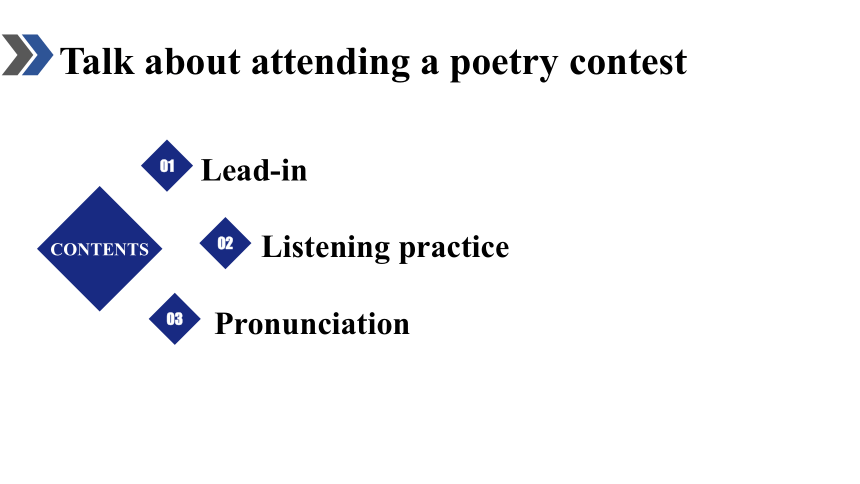
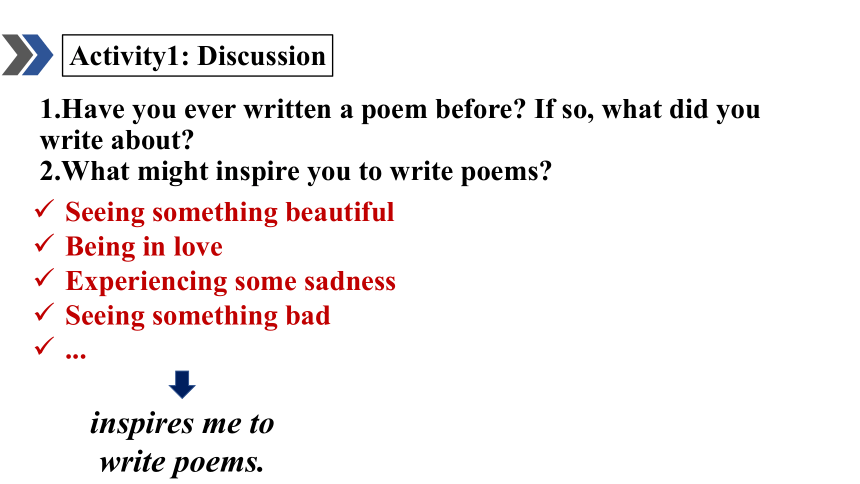

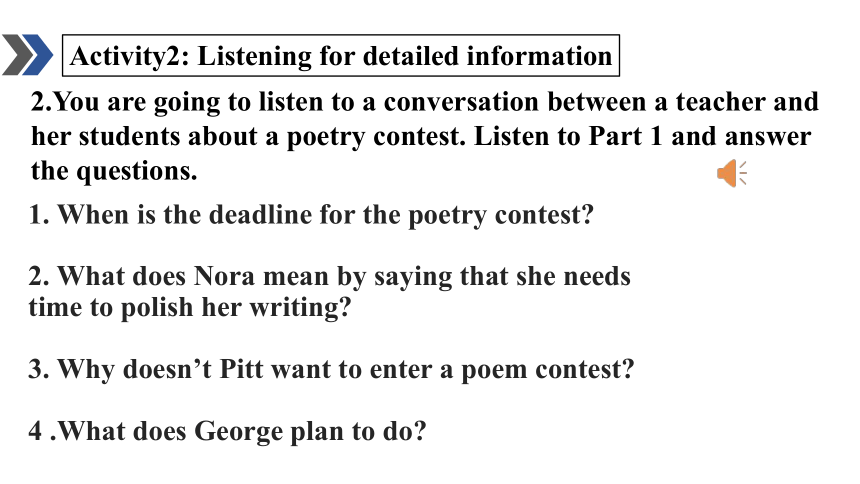
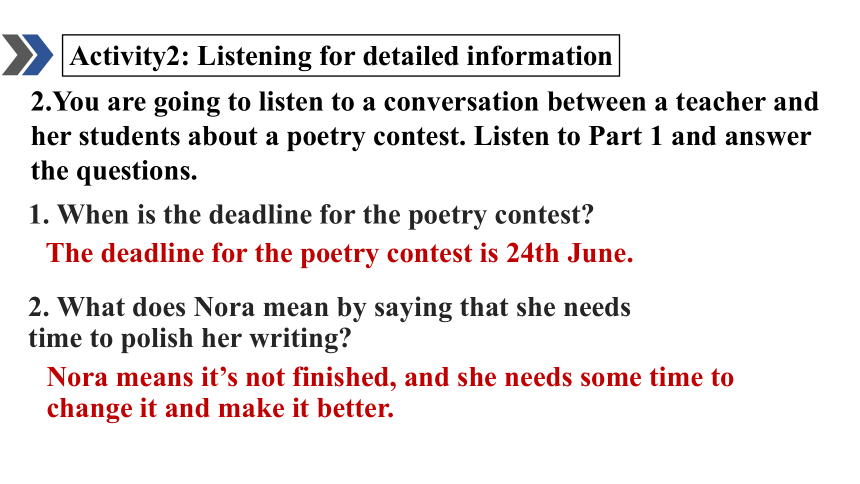
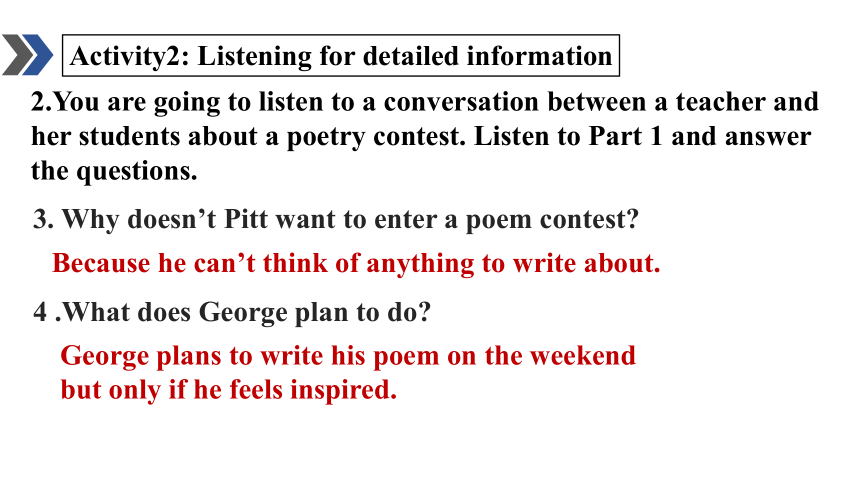
文档简介
(共16张PPT)
Using Language(1): Listening and Speaking
(选择性必修三Unit5 Poems)
CONTENTS
01
02
03
Lead-in
Listening practice
Pronunciation
Talk about attending a poetry contest
Activity1: Discussion
1.Have you ever written a poem before If so, what did you write about
2.What might inspire you to write poems
Seeing something beautiful
Being in love
Experiencing some sadness
Seeing something bad
...
inspires me to write poems.
A useful tip for listening
Use your prior knowledge
If you come across a topic you are familiar with, you can think about what you already know about it before you listen. Using prior knowledge will make it easier for you to predict what you will hear.This will also reduce your anxiety and help you better understand the conversation while listening.
Activity2: Listening for detailed information
2.You are going to listen to a conversation between a teacher and her students about a poetry contest. Listen to Part 1 and answer the questions.
1. When is the deadline for the poetry contest
2. What does Nora mean by saying that she needs time to polish her writing
3. Why doesn’t Pitt want to enter a poem contest
4 .What does George plan to do
Activity2: Listening for detailed information
2.You are going to listen to a conversation between a teacher and her students about a poetry contest. Listen to Part 1 and answer the questions.
1. When is the deadline for the poetry contest
2. What does Nora mean by saying that she needs time to polish her writing
The deadline for the poetry contest is 24th June.
Nora means it’s not finished, and she needs some time to change it and make it better.
Activity2: Listening for detailed information
2.You are going to listen to a conversation between a teacher and her students about a poetry contest. Listen to Part 1 and answer the questions.
3. Why doesn’t Pitt want to enter a poem contest
4 .What does George plan to do
Because he can’t think of anything to write about.
George plans to write his poem on the weekend but only if he feels inspired.
Activity3: Listening for detailed information
3. Listen to Part 2 and find out how the students will inspire themselves to write poetry.
George: ______________________________
______________________________
2. Nora: ______________________________
______________________________
3. Pitt: ______________________________
______________________________
When you are listening for detailed information, here pay attention to “how to inspire”,and take notes while listening.
Activity3: Listening for detailed information
3. Listen to Part 2 and find out how the students will inspire themselves to write poetry.
George:
Well, I plans to go for a hike in the countryside and sit quietly somewhere by myself. I think I’ll notice a lot more-an insect carrying something, the shapes and colours of the flowers, how the wind sounds, or the different smells in the air . As I look around me, all sorts of interesting thoughts and words may come into my mind.
Activity3: Listening for detailed information
3. Listen to Part 2 and find out how the students will inspire themselves to write poetry.
Nora:
I usually write best when I am surrounded by familiar things, like in my own house. But now that I’ve listened to George, I think I’ll try out his method some time, too.
Pitt:
Actually, I work best on my homework when I’m listening to my favourite music. I’ve never tried it with poetry before but I’m going to try it tonight.
Activity4: Listening for phrases of praise
and encouragement.
4. Listen to the two parts again and tick the expressions you hear that are used to praise and encourage somebody.
Praising and encouraging
That’s a good idea.
That’s a good effort.
What a great idea!
Keep up the good work.
I think that's a fantastic idea.
Come on, you can do it.
I like that idea.
You are doing well.
Your ideas sound very encouraging to me.
Do your best.
You know what That’s a good idea.
Give it your best shot.
√
√
√
√
Activity5: Discussion
Work in groups. Discuss entering a poem contest
like the one in the listening section. The expressions
in Activity4 and the following questions may help you.
1. What kind of poem are you going to write
2. What are the topics you would love to write about
3. How will you inspire yourself to write the poem
4. Will you use rhyming words in your poem
Why
A useful tip for reading poetry
Read poetry aloud
Poetry should always be read aloud, as that is when you can hear the music of the words. When reading poetry aloud, start slowly. Find and emphasise the rhythm of the words. Begin to think about how the poem makes you feel – happy, sad, in love – and read the poem with emotion, pouring out your feelings.
Activity6:Pronunciation
Listen and practise reading the following poems aloud. Pay attention to the rhyming words and the rhythm of the poems.
I shot an arrow into the air,
It fell to earth, I knew not where;
For, so swiftly it flew, the sight
Could not follow it in its flight.
I breathed a song into the air,
It fell to earth, I knew no where;
For who has sight so keen and strong,
That it can follow the flight of song
Long, long afterwards, in an oak
I found the arrow, still unbroke;
And the song, from beginning to end,
I found again in the heart of a friend.
THE ARROW AND THE SONG
H. W. Longfellow
Activity6:Pronunciation
NIGHT
The sun descending in the west,
The evening star does shine;
The birds are silent in their nest,
And I must seek for mine.
The moon,like a flower,
In heaven’s high bower,
With silent delight,
Sits and smiles on the night.
Farewell, green fields and happy groves,
Where flocks have took delight.
Where lambs have nibbled, silent moves
The feet of angels bright;
Unseen, they pour blessing,
And joy without ceasing,
On each bud and blossom,
And each sleeping bosom.
William Blake
Assignment
1.Make a list about what might inspire you to write a poem. Please explain why.
2. Write a poem by referring to the forms in the passage on page50-51.
Using Language(1): Listening and Speaking
(选择性必修三Unit5 Poems)
CONTENTS
01
02
03
Lead-in
Listening practice
Pronunciation
Talk about attending a poetry contest
Activity1: Discussion
1.Have you ever written a poem before If so, what did you write about
2.What might inspire you to write poems
Seeing something beautiful
Being in love
Experiencing some sadness
Seeing something bad
...
inspires me to write poems.
A useful tip for listening
Use your prior knowledge
If you come across a topic you are familiar with, you can think about what you already know about it before you listen. Using prior knowledge will make it easier for you to predict what you will hear.This will also reduce your anxiety and help you better understand the conversation while listening.
Activity2: Listening for detailed information
2.You are going to listen to a conversation between a teacher and her students about a poetry contest. Listen to Part 1 and answer the questions.
1. When is the deadline for the poetry contest
2. What does Nora mean by saying that she needs time to polish her writing
3. Why doesn’t Pitt want to enter a poem contest
4 .What does George plan to do
Activity2: Listening for detailed information
2.You are going to listen to a conversation between a teacher and her students about a poetry contest. Listen to Part 1 and answer the questions.
1. When is the deadline for the poetry contest
2. What does Nora mean by saying that she needs time to polish her writing
The deadline for the poetry contest is 24th June.
Nora means it’s not finished, and she needs some time to change it and make it better.
Activity2: Listening for detailed information
2.You are going to listen to a conversation between a teacher and her students about a poetry contest. Listen to Part 1 and answer the questions.
3. Why doesn’t Pitt want to enter a poem contest
4 .What does George plan to do
Because he can’t think of anything to write about.
George plans to write his poem on the weekend but only if he feels inspired.
Activity3: Listening for detailed information
3. Listen to Part 2 and find out how the students will inspire themselves to write poetry.
George: ______________________________
______________________________
2. Nora: ______________________________
______________________________
3. Pitt: ______________________________
______________________________
When you are listening for detailed information, here pay attention to “how to inspire”,and take notes while listening.
Activity3: Listening for detailed information
3. Listen to Part 2 and find out how the students will inspire themselves to write poetry.
George:
Well, I plans to go for a hike in the countryside and sit quietly somewhere by myself. I think I’ll notice a lot more-an insect carrying something, the shapes and colours of the flowers, how the wind sounds, or the different smells in the air . As I look around me, all sorts of interesting thoughts and words may come into my mind.
Activity3: Listening for detailed information
3. Listen to Part 2 and find out how the students will inspire themselves to write poetry.
Nora:
I usually write best when I am surrounded by familiar things, like in my own house. But now that I’ve listened to George, I think I’ll try out his method some time, too.
Pitt:
Actually, I work best on my homework when I’m listening to my favourite music. I’ve never tried it with poetry before but I’m going to try it tonight.
Activity4: Listening for phrases of praise
and encouragement.
4. Listen to the two parts again and tick the expressions you hear that are used to praise and encourage somebody.
Praising and encouraging
That’s a good idea.
That’s a good effort.
What a great idea!
Keep up the good work.
I think that's a fantastic idea.
Come on, you can do it.
I like that idea.
You are doing well.
Your ideas sound very encouraging to me.
Do your best.
You know what That’s a good idea.
Give it your best shot.
√
√
√
√
Activity5: Discussion
Work in groups. Discuss entering a poem contest
like the one in the listening section. The expressions
in Activity4 and the following questions may help you.
1. What kind of poem are you going to write
2. What are the topics you would love to write about
3. How will you inspire yourself to write the poem
4. Will you use rhyming words in your poem
Why
A useful tip for reading poetry
Read poetry aloud
Poetry should always be read aloud, as that is when you can hear the music of the words. When reading poetry aloud, start slowly. Find and emphasise the rhythm of the words. Begin to think about how the poem makes you feel – happy, sad, in love – and read the poem with emotion, pouring out your feelings.
Activity6:Pronunciation
Listen and practise reading the following poems aloud. Pay attention to the rhyming words and the rhythm of the poems.
I shot an arrow into the air,
It fell to earth, I knew not where;
For, so swiftly it flew, the sight
Could not follow it in its flight.
I breathed a song into the air,
It fell to earth, I knew no where;
For who has sight so keen and strong,
That it can follow the flight of song
Long, long afterwards, in an oak
I found the arrow, still unbroke;
And the song, from beginning to end,
I found again in the heart of a friend.
THE ARROW AND THE SONG
H. W. Longfellow
Activity6:Pronunciation
NIGHT
The sun descending in the west,
The evening star does shine;
The birds are silent in their nest,
And I must seek for mine.
The moon,like a flower,
In heaven’s high bower,
With silent delight,
Sits and smiles on the night.
Farewell, green fields and happy groves,
Where flocks have took delight.
Where lambs have nibbled, silent moves
The feet of angels bright;
Unseen, they pour blessing,
And joy without ceasing,
On each bud and blossom,
And each sleeping bosom.
William Blake
Assignment
1.Make a list about what might inspire you to write a poem. Please explain why.
2. Write a poem by referring to the forms in the passage on page50-51.
